The 10 finalists will appear at a reading with the San Jose Public Library on Tuesday, April 20, online from 5-6pm. Details and registration here.
A full list of finalists, with bios provided by the Santa Clara County Youth Poet Laureate program, can be found below.
Mahder Aklilu
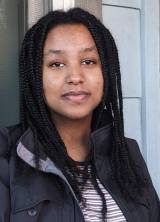 I am the daughter of so many people who have struggled and communicated through art. I am the daughter of parents who protested dictatorship and carried on their activist spirit into me. I am proud of my black identity and my identity as an immigrant. I am on Ohlone land also known as San Jose and I have lived here for the past 12 years. I’m a junior in high school excited and energized to use my voice for good!
I am the daughter of so many people who have struggled and communicated through art. I am the daughter of parents who protested dictatorship and carried on their activist spirit into me. I am proud of my black identity and my identity as an immigrant. I am on Ohlone land also known as San Jose and I have lived here for the past 12 years. I’m a junior in high school excited and energized to use my voice for good!
Paula Escobar
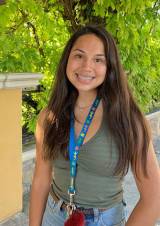 Born and raised in San Jose, Paula Escobar is a proud Bolivian-American and first generation student. Inspired by her mother and older sister, Paula is driven to catalyze change within her community and promote inclusivity. Seeing how impactful schooling has been to her family, she is an advocate for educational justice and wants all students to feel empowered in their communities. As secretary of the East Side Union High School District Student Governing Board and a Santa Clara County Juvenile Justice Commissioner, she hopes to amplify diverse student voices and advocate for restorative justice. Her current efforts involve planning the Ethnic Studies course in her school district and representing over 23,000 students on the ESUHSD Instructional Policy Committee. With poetry, Paula wants to carry forward the values that have inspired her and channel words of empowerment. As a candidate for the Youth Poet Laureate program, Paula hopes to explore different mediums of writing and create accessible outlets for youth to express themselves. When she is not writing, you can find her baking with her family, working on history homework, or listening to music. In the future, Paula hopes to attend law school and become a civil rights lawyer to protect the rights of youth of color.
Born and raised in San Jose, Paula Escobar is a proud Bolivian-American and first generation student. Inspired by her mother and older sister, Paula is driven to catalyze change within her community and promote inclusivity. Seeing how impactful schooling has been to her family, she is an advocate for educational justice and wants all students to feel empowered in their communities. As secretary of the East Side Union High School District Student Governing Board and a Santa Clara County Juvenile Justice Commissioner, she hopes to amplify diverse student voices and advocate for restorative justice. Her current efforts involve planning the Ethnic Studies course in her school district and representing over 23,000 students on the ESUHSD Instructional Policy Committee. With poetry, Paula wants to carry forward the values that have inspired her and channel words of empowerment. As a candidate for the Youth Poet Laureate program, Paula hopes to explore different mediums of writing and create accessible outlets for youth to express themselves. When she is not writing, you can find her baking with her family, working on history homework, or listening to music. In the future, Paula hopes to attend law school and become a civil rights lawyer to protect the rights of youth of color.
Trisha Iyer
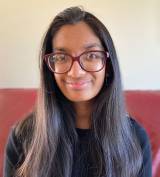 Hi, I’m Trisha Iyer and I live in Cupertino. My relationship with poetry began in first grade, when I wrote some questionably-rhymed odes to a future, imaginary pet in order to persuade my parents into adopting a dog. Since then, my work has evolved in skill and language, but has become no less purposeful. I draw inspiration from the carefully worded, stirring verses of Edna St. Vincent Millay, the sparse, precise language of William Blake, and the works of ancient poets like Catullus (e.g., his slyly-lampooning Carmen 9) and Horace. In my own poetry, I try to achieve what I so admire in the works of my favorite poets. Poetry is my chance to offer to my readers an unconventional, rarely-heard yet very necessary perspective—sometimes my own—on various topics in order to foster empathy. My poetry is very introspective, and I place special value on weaving rich word choice, strong sensory details, and notes of hope into my pieces. I delight, in particular, in writing meaning into everyday experiences in order to bridge the gap of understanding between my reader and myself—whether that analogy mentions how blurry the world looks to my nearsighted self sees without my glasses or why a chiffon dress imbues beauty and fearlessness on the wearer through its translucence. In my free time, I play with my dog (the poems I wrote at age seven were more effective than I expected), indulge my passion for fashion illustration, dance, and of course, read.
Hi, I’m Trisha Iyer and I live in Cupertino. My relationship with poetry began in first grade, when I wrote some questionably-rhymed odes to a future, imaginary pet in order to persuade my parents into adopting a dog. Since then, my work has evolved in skill and language, but has become no less purposeful. I draw inspiration from the carefully worded, stirring verses of Edna St. Vincent Millay, the sparse, precise language of William Blake, and the works of ancient poets like Catullus (e.g., his slyly-lampooning Carmen 9) and Horace. In my own poetry, I try to achieve what I so admire in the works of my favorite poets. Poetry is my chance to offer to my readers an unconventional, rarely-heard yet very necessary perspective—sometimes my own—on various topics in order to foster empathy. My poetry is very introspective, and I place special value on weaving rich word choice, strong sensory details, and notes of hope into my pieces. I delight, in particular, in writing meaning into everyday experiences in order to bridge the gap of understanding between my reader and myself—whether that analogy mentions how blurry the world looks to my nearsighted self sees without my glasses or why a chiffon dress imbues beauty and fearlessness on the wearer through its translucence. In my free time, I play with my dog (the poems I wrote at age seven were more effective than I expected), indulge my passion for fashion illustration, dance, and of course, read.
Swasti Johri
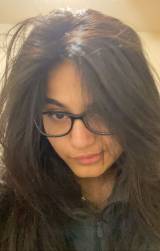 My name is Swasti Johri, and I’m currently a junior at Evergreen Valley High School. I love to explore my creativity through several different avenues, including drawing, pottery, and poetry. For the longest time, I didn’t think poetry was for me; I had no faith in my abilities as a writer, but over quarantine, my love for the art was reinvigorated after I expressed my frustration through it. Really, that’s what poetry is to me; relief from emotions difficult for me to comprehend. It’s something I use to cope with the anxiety I feel when I can’t control things, including my mental health and issues around the world.
My name is Swasti Johri, and I’m currently a junior at Evergreen Valley High School. I love to explore my creativity through several different avenues, including drawing, pottery, and poetry. For the longest time, I didn’t think poetry was for me; I had no faith in my abilities as a writer, but over quarantine, my love for the art was reinvigorated after I expressed my frustration through it. Really, that’s what poetry is to me; relief from emotions difficult for me to comprehend. It’s something I use to cope with the anxiety I feel when I can’t control things, including my mental health and issues around the world.
I’ve now become passionate about spreading my new-found love for writing to others. Showing people that it’s more than just a boring class in school, and a mind-blowing, beautiful way to connect with others and buried parts of yourself. It’s a therapeutic coping mechanism that can save you from succumbing to societal pressures and problems.
Jasmine Kapadia
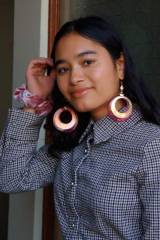 Jasmine Kapadia (she/her) is an Asian-American poet and activist. She is a 2021 Write the World Community Ambassador, the Mandarin Course Manager for Polyglot Perspectives and holds editorial roles with Indigo Lit and Polyphony Lit. Her poetry is unflinching in the face of a country that tells Asian-Americans to keep their heads down, to be quiet and not make trouble. She writes to claim back the labels that society has given her: Chinese-American, Indian-American, Girl. She writes to document the sacrifices of her elders and ancestors and to tell their stories. She has work in or forthcoming in Kissing Dynamite, The Bitchin’ Kitsch, the Eunoia Review, Malala Fund’s Assembly, All Guts No Glory, and elsewhere. When not writing, she can be found stanning Beyoncé, over-applying lipgloss, and (re)-binge-watching RuPaul’s Drag Race. Find her on Instagram: @jazzymoons
Jasmine Kapadia (she/her) is an Asian-American poet and activist. She is a 2021 Write the World Community Ambassador, the Mandarin Course Manager for Polyglot Perspectives and holds editorial roles with Indigo Lit and Polyphony Lit. Her poetry is unflinching in the face of a country that tells Asian-Americans to keep their heads down, to be quiet and not make trouble. She writes to claim back the labels that society has given her: Chinese-American, Indian-American, Girl. She writes to document the sacrifices of her elders and ancestors and to tell their stories. She has work in or forthcoming in Kissing Dynamite, The Bitchin’ Kitsch, the Eunoia Review, Malala Fund’s Assembly, All Guts No Glory, and elsewhere. When not writing, she can be found stanning Beyoncé, over-applying lipgloss, and (re)-binge-watching RuPaul’s Drag Race. Find her on Instagram: @jazzymoons
Avalon Felice Lee
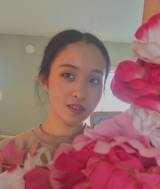 I am Avalon Felice Lee, an Asian American poet and proser. To me, poetry offers a way to live in the minutes that slip by, unnoticed. Simply the act of writing is a recipe of pointing out details that are felt but not explicitly seen, which is the difference between the atmosphere that we live in versus the planetary body we orbit. Perhaps this is why poetry is an art form necessary for progress, as necessary as galvanizing speeches and key legislation. Atrocity persists because they are not held at point-blank, not brought to light for all to witness. And what better way to expose our follies than by cocooning them in poetic verse?
I am Avalon Felice Lee, an Asian American poet and proser. To me, poetry offers a way to live in the minutes that slip by, unnoticed. Simply the act of writing is a recipe of pointing out details that are felt but not explicitly seen, which is the difference between the atmosphere that we live in versus the planetary body we orbit. Perhaps this is why poetry is an art form necessary for progress, as necessary as galvanizing speeches and key legislation. Atrocity persists because they are not held at point-blank, not brought to light for all to witness. And what better way to expose our follies than by cocooning them in poetic verse?
Margaret Mei
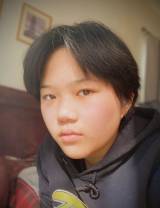 My name is Margaret Mei, and poetry is where I throw together ideas, emotions, and events that I come across in life. Sometimes it’s turns out to be a comedic poem, and it brings a smile to my face. Other times it’s a sad poem, and I feel relief from being able to see what the sad in me looks like from afar. Or it’s a simple story that I come up with on the spot. Poetry is a place for my experiences and my ideas. It’s a junkyard, except that junk is precious.
My name is Margaret Mei, and poetry is where I throw together ideas, emotions, and events that I come across in life. Sometimes it’s turns out to be a comedic poem, and it brings a smile to my face. Other times it’s a sad poem, and I feel relief from being able to see what the sad in me looks like from afar. Or it’s a simple story that I come up with on the spot. Poetry is a place for my experiences and my ideas. It’s a junkyard, except that junk is precious.
Sarah Fathima Mohammed
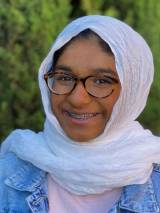 My name is Sarah Fathima Mohammed, and I am a first-generation Muslim-American and South-Asian poet from Santa Clara County.
My name is Sarah Fathima Mohammed, and I am a first-generation Muslim-American and South-Asian poet from Santa Clara County.
As I navigated my identity over the years, I oscillated between inexplicable loneliness and grief: I felt so alone, surrounded by people who didn’t look like me. I struggled to find community in spaces where I was often the only Muslim girl. And as I scrolled through the New York Times and again caught sight of a headline detailing a mosque shooting, a heaviness washed over me, one that is deeper than the ground beneath us, a heaviness that, for so long, I kept lodged in the back of my throat.
When I began to foray into poetry, I found solace that there were poets who looked like me. I read Safia Elhillo, Aria Aber, and Fatimah Asghar at the library, I devoured them. They mentored me from a distance: through their books. I learned that literature was more than the Shakespeare I read in school. Poetry was dynamic, was full: my people belonged here. Yes, poetry was a space where I could bridge words and find solace in the space between them.
Poetry was a tradition I began to learn, one that was unabashed and heart-wrenching. I conversed with these poets as ancestors, inviting myself into this lineage in which I could be bold and unafraid in drawing from my emotions, from my grief.
I want my generation to understand poetry as a communal soil, as a ground for sharing.
Anna Yang
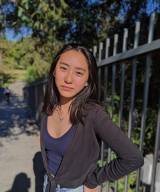 I originally found poetry in fourth grade, writing metaphors about owls and moons, lions and storms. Looking back on my first poem, I can feel the sparks in my fingers as I dragged a pink mechanical pencil across the paper, and the corners of my lips lifting up just thinking about a little girl in braids imagining a lion hunting in the rain. I can almost feel my legs, sore from standing on my toes for too long, trying to hang my poem up on my wall amongst the math certificates my mom had put up for me.
I originally found poetry in fourth grade, writing metaphors about owls and moons, lions and storms. Looking back on my first poem, I can feel the sparks in my fingers as I dragged a pink mechanical pencil across the paper, and the corners of my lips lifting up just thinking about a little girl in braids imagining a lion hunting in the rain. I can almost feel my legs, sore from standing on my toes for too long, trying to hang my poem up on my wall amongst the math certificates my mom had put up for me.
Growing up in Silicon Valley, I’ve always lived a fast-paced and structured life. When the world of 1’s and 0’s becomes overwhelming, I allow myself to be swallowed by poetry. My words form misshapen stanzas, engulf the page with spilling emotions, tell my stories that scream to be heard, create new paradises and dystopias.
Ever since my first poetry lesson, I continued to ponder the definition, the feeling, and the impact of each word in my writing. Not only does my poetry create a refuge for creative expression, it also yearns to incite thought within its readers. At times, my passion for social justice seeps between the lines, where it manifests as anger and hope for change. However, with six years of poetry experience, I’m still learning to tell the stories of other backgrounds and capture the pieces of myself that I have yet to express.
Anouk Yeh
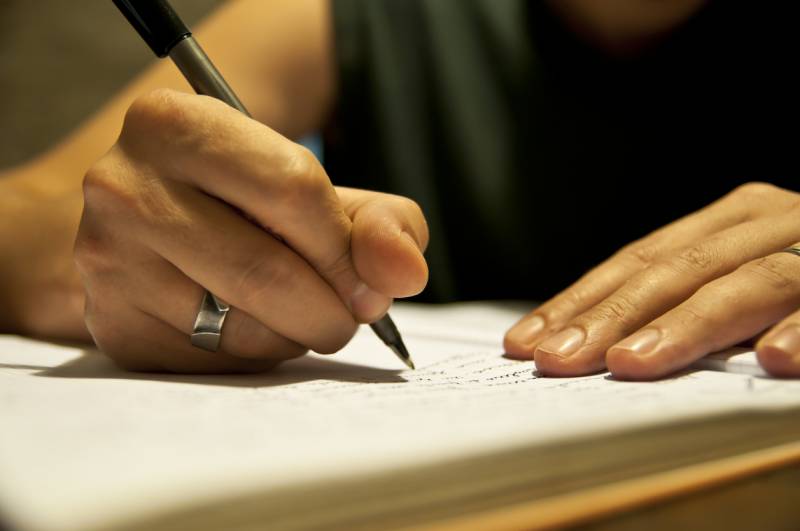
 I am the daughter of so many people who have struggled and communicated through art. I am the daughter of parents who protested dictatorship and carried on their activist spirit into me. I am proud of my black identity and my identity as an immigrant. I am on Ohlone land also known as San Jose and I have lived here for the past 12 years. I’m a junior in high school excited and energized to use my voice for good!
I am the daughter of so many people who have struggled and communicated through art. I am the daughter of parents who protested dictatorship and carried on their activist spirit into me. I am proud of my black identity and my identity as an immigrant. I am on Ohlone land also known as San Jose and I have lived here for the past 12 years. I’m a junior in high school excited and energized to use my voice for good! Born and raised in San Jose, Paula Escobar is a proud Bolivian-American and first generation student. Inspired by her mother and older sister, Paula is driven to catalyze change within her community and promote inclusivity. Seeing how impactful schooling has been to her family, she is an advocate for educational justice and wants all students to feel empowered in their communities. As secretary of the East Side Union High School District Student Governing Board and a Santa Clara County Juvenile Justice Commissioner, she hopes to amplify diverse student voices and advocate for restorative justice. Her current efforts involve planning the Ethnic Studies course in her school district and representing over 23,000 students on the ESUHSD Instructional Policy Committee. With poetry, Paula wants to carry forward the values that have inspired her and channel words of empowerment. As a candidate for the Youth Poet Laureate program, Paula hopes to explore different mediums of writing and create accessible outlets for youth to express themselves. When she is not writing, you can find her baking with her family, working on history homework, or listening to music. In the future, Paula hopes to attend law school and become a civil rights lawyer to protect the rights of youth of color.
Born and raised in San Jose, Paula Escobar is a proud Bolivian-American and first generation student. Inspired by her mother and older sister, Paula is driven to catalyze change within her community and promote inclusivity. Seeing how impactful schooling has been to her family, she is an advocate for educational justice and wants all students to feel empowered in their communities. As secretary of the East Side Union High School District Student Governing Board and a Santa Clara County Juvenile Justice Commissioner, she hopes to amplify diverse student voices and advocate for restorative justice. Her current efforts involve planning the Ethnic Studies course in her school district and representing over 23,000 students on the ESUHSD Instructional Policy Committee. With poetry, Paula wants to carry forward the values that have inspired her and channel words of empowerment. As a candidate for the Youth Poet Laureate program, Paula hopes to explore different mediums of writing and create accessible outlets for youth to express themselves. When she is not writing, you can find her baking with her family, working on history homework, or listening to music. In the future, Paula hopes to attend law school and become a civil rights lawyer to protect the rights of youth of color. Hi, I’m Trisha Iyer and I live in Cupertino. My relationship with poetry began in first grade, when I wrote some questionably-rhymed odes to a future, imaginary pet in order to persuade my parents into adopting a dog. Since then, my work has evolved in skill and language, but has become no less purposeful. I draw inspiration from the carefully worded, stirring verses of Edna St. Vincent Millay, the sparse, precise language of William Blake, and the works of ancient poets like Catullus (e.g., his slyly-lampooning Carmen 9) and Horace. In my own poetry, I try to achieve what I so admire in the works of my favorite poets. Poetry is my chance to offer to my readers an unconventional, rarely-heard yet very necessary perspective—sometimes my own—on various topics in order to foster empathy. My poetry is very introspective, and I place special value on weaving rich word choice, strong sensory details, and notes of hope into my pieces. I delight, in particular, in writing meaning into everyday experiences in order to bridge the gap of understanding between my reader and myself—whether that analogy mentions how blurry the world looks to my nearsighted self sees without my glasses or why a chiffon dress imbues beauty and fearlessness on the wearer through its translucence. In my free time, I play with my dog (the poems I wrote at age seven were more effective than I expected), indulge my passion for fashion illustration, dance, and of course, read.
Hi, I’m Trisha Iyer and I live in Cupertino. My relationship with poetry began in first grade, when I wrote some questionably-rhymed odes to a future, imaginary pet in order to persuade my parents into adopting a dog. Since then, my work has evolved in skill and language, but has become no less purposeful. I draw inspiration from the carefully worded, stirring verses of Edna St. Vincent Millay, the sparse, precise language of William Blake, and the works of ancient poets like Catullus (e.g., his slyly-lampooning Carmen 9) and Horace. In my own poetry, I try to achieve what I so admire in the works of my favorite poets. Poetry is my chance to offer to my readers an unconventional, rarely-heard yet very necessary perspective—sometimes my own—on various topics in order to foster empathy. My poetry is very introspective, and I place special value on weaving rich word choice, strong sensory details, and notes of hope into my pieces. I delight, in particular, in writing meaning into everyday experiences in order to bridge the gap of understanding between my reader and myself—whether that analogy mentions how blurry the world looks to my nearsighted self sees without my glasses or why a chiffon dress imbues beauty and fearlessness on the wearer through its translucence. In my free time, I play with my dog (the poems I wrote at age seven were more effective than I expected), indulge my passion for fashion illustration, dance, and of course, read. My name is Swasti Johri, and I’m currently a junior at Evergreen Valley High School. I love to explore my creativity through several different avenues, including drawing, pottery, and poetry. For the longest time, I didn’t think poetry was for me; I had no faith in my abilities as a writer, but over quarantine, my love for the art was reinvigorated after I expressed my frustration through it. Really, that’s what poetry is to me; relief from emotions difficult for me to comprehend. It’s something I use to cope with the anxiety I feel when I can’t control things, including my mental health and issues around the world.
My name is Swasti Johri, and I’m currently a junior at Evergreen Valley High School. I love to explore my creativity through several different avenues, including drawing, pottery, and poetry. For the longest time, I didn’t think poetry was for me; I had no faith in my abilities as a writer, but over quarantine, my love for the art was reinvigorated after I expressed my frustration through it. Really, that’s what poetry is to me; relief from emotions difficult for me to comprehend. It’s something I use to cope with the anxiety I feel when I can’t control things, including my mental health and issues around the world.  Jasmine Kapadia (she/her) is an Asian-American poet and activist. She is a 2021 Write the World Community Ambassador, the Mandarin Course Manager for Polyglot Perspectives and holds editorial roles with Indigo Lit and Polyphony Lit. Her poetry is unflinching in the face of a country that tells Asian-Americans to keep their heads down, to be quiet and not make trouble. She writes to claim back the labels that society has given her: Chinese-American, Indian-American, Girl. She writes to document the sacrifices of her elders and ancestors and to tell their stories. She has work in or forthcoming in Kissing Dynamite, The Bitchin’ Kitsch, the Eunoia Review, Malala Fund’s Assembly, All Guts No Glory, and elsewhere. When not writing, she can be found stanning Beyoncé, over-applying lipgloss, and (re)-binge-watching RuPaul’s Drag Race. Find her on Instagram: @jazzymoons
Jasmine Kapadia (she/her) is an Asian-American poet and activist. She is a 2021 Write the World Community Ambassador, the Mandarin Course Manager for Polyglot Perspectives and holds editorial roles with Indigo Lit and Polyphony Lit. Her poetry is unflinching in the face of a country that tells Asian-Americans to keep their heads down, to be quiet and not make trouble. She writes to claim back the labels that society has given her: Chinese-American, Indian-American, Girl. She writes to document the sacrifices of her elders and ancestors and to tell their stories. She has work in or forthcoming in Kissing Dynamite, The Bitchin’ Kitsch, the Eunoia Review, Malala Fund’s Assembly, All Guts No Glory, and elsewhere. When not writing, she can be found stanning Beyoncé, over-applying lipgloss, and (re)-binge-watching RuPaul’s Drag Race. Find her on Instagram: @jazzymoons I am Avalon Felice Lee, an Asian American poet and proser. To me, poetry offers a way to live in the minutes that slip by, unnoticed. Simply the act of writing is a recipe of pointing out details that are felt but not explicitly seen, which is the difference between the atmosphere that we live in versus the planetary body we orbit. Perhaps this is why poetry is an art form necessary for progress, as necessary as galvanizing speeches and key legislation. Atrocity persists because they are not held at point-blank, not brought to light for all to witness. And what better way to expose our follies than by cocooning them in poetic verse?
I am Avalon Felice Lee, an Asian American poet and proser. To me, poetry offers a way to live in the minutes that slip by, unnoticed. Simply the act of writing is a recipe of pointing out details that are felt but not explicitly seen, which is the difference between the atmosphere that we live in versus the planetary body we orbit. Perhaps this is why poetry is an art form necessary for progress, as necessary as galvanizing speeches and key legislation. Atrocity persists because they are not held at point-blank, not brought to light for all to witness. And what better way to expose our follies than by cocooning them in poetic verse?  My name is Margaret Mei, and poetry is where I throw together ideas, emotions, and events that I come across in life. Sometimes it’s turns out to be a comedic poem, and it brings a smile to my face. Other times it’s a sad poem, and I feel relief from being able to see what the sad in me looks like from afar. Or it’s a simple story that I come up with on the spot. Poetry is a place for my experiences and my ideas. It’s a junkyard, except that junk is precious.
My name is Margaret Mei, and poetry is where I throw together ideas, emotions, and events that I come across in life. Sometimes it’s turns out to be a comedic poem, and it brings a smile to my face. Other times it’s a sad poem, and I feel relief from being able to see what the sad in me looks like from afar. Or it’s a simple story that I come up with on the spot. Poetry is a place for my experiences and my ideas. It’s a junkyard, except that junk is precious. My name is Sarah Fathima Mohammed, and I am a first-generation Muslim-American and South-Asian poet from Santa Clara County.
My name is Sarah Fathima Mohammed, and I am a first-generation Muslim-American and South-Asian poet from Santa Clara County.  I originally found poetry in fourth grade, writing metaphors about owls and moons, lions and storms. Looking back on my first poem, I can feel the sparks in my fingers as I dragged a pink mechanical pencil across the paper, and the corners of my lips lifting up just thinking about a little girl in braids imagining a lion hunting in the rain. I can almost feel my legs, sore from standing on my toes for too long, trying to hang my poem up on my wall amongst the math certificates my mom had put up for me.
I originally found poetry in fourth grade, writing metaphors about owls and moons, lions and storms. Looking back on my first poem, I can feel the sparks in my fingers as I dragged a pink mechanical pencil across the paper, and the corners of my lips lifting up just thinking about a little girl in braids imagining a lion hunting in the rain. I can almost feel my legs, sore from standing on my toes for too long, trying to hang my poem up on my wall amongst the math certificates my mom had put up for me.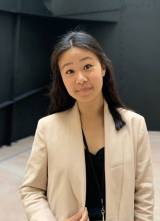 Anouk Yeh is a 17 year old spoken word poet from Saratoga, California. She is a firm believer in Toni Cade Cambarayou’s words: “The role of the artist is to make the revolution irresistible” and is always looking for inventive ways to tackle current events in her poetry. Especially in politically polarizing times where opposing sides seem reluctant to foster authentic conversations with one another, she believes that poetry has the power to heal, move and connect. Yeh was the 2018 Cupertino City Youth Poetry Slam Champion and a 2020 National Student Poet Program semifinalist. Her work has been featured by Stanford University, Planned Parenthood and the Los Angeles Review of Books. She has spoken after prominent figures including Congresswoman Anna Eshoo, California State Controller Betty Yee and peace activist Ela Gandhi.
Anouk Yeh is a 17 year old spoken word poet from Saratoga, California. She is a firm believer in Toni Cade Cambarayou’s words: “The role of the artist is to make the revolution irresistible” and is always looking for inventive ways to tackle current events in her poetry. Especially in politically polarizing times where opposing sides seem reluctant to foster authentic conversations with one another, she believes that poetry has the power to heal, move and connect. Yeh was the 2018 Cupertino City Youth Poetry Slam Champion and a 2020 National Student Poet Program semifinalist. Her work has been featured by Stanford University, Planned Parenthood and the Los Angeles Review of Books. She has spoken after prominent figures including Congresswoman Anna Eshoo, California State Controller Betty Yee and peace activist Ela Gandhi. 
